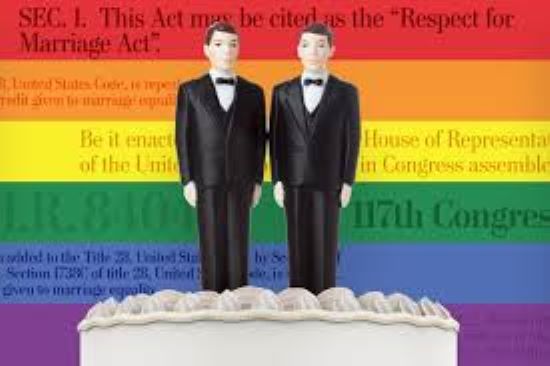|
Later this month President Biden will sign into law the Respect for Marriage Act. Even though this law won’t be perfect, it does provide some very important protections for same-sex and interracial couples, and should be considered a holiday gift to the American people in the waning days of the 117th Congress. What is the Respect for Marriage Act? The bill was approved by the House of Representatives in July and then moved to the Senate for consideration. After the inclusion of an amendment which provides certain protections to nonprofit religious organizations, the bill was passed by the Senate on November 22, 2022. All Democrats and 12 Republicans voted for the bill, getting it past the 60 votes needed for passage. Since the House version of the bill was amended in the Senate, it will return to the House for a final vote. This should happen within the next two weeks before going to the President for his signature. For the purposes of federal law, the bill redefines the definition of marriage, and requires all states to recognize any marriage that was legal in the state where it was entered into. The bill also prohibits polygamous marriages, and protects religious organizations who refuse to perform marriage ceremonies that are counter to their beliefs. Revised Definition of Marriage: The bill repeals the Defense of Marriage Act, which defined marriage as “a legal union between one man and one woman as husband and wife”. Under the new bill, the federal government will recognize any marriage between two individuals which is valid in the state where the marriage was entered into. This gives same-sex and interracial couples equal treatment under the law as any other married couples. New Protections: All states must recognize the marriages of couples legally married in other states. State officials must afford the same rights and protections to all married couples, regardless of the sex, race, ethnicity, or national origin of the individuals involved. Even though all 50 states currently allow same-sex and interracial marriages, these marriages are not protected by federal law, and are subject to the whims of the Supreme Court and state officials. Religious Protections: Senate Republicans would never have voted for the bill without the support of the religious right and some major religious organizations. These organizations were worried about losing their precious tax-exempt status if they didn’t go along with the provisions of the bill. In order to win the support of the religious right, Senate Republicans negotiated with Democrats to amend the House version of the bill. The amendment won the support of the Mormon church, the Council for Christian Colleges and Universities, the Union of Orthodox Jewish Congregations of America, and the National Association of Evangelicals. The bill provides the following protections:
Many on the left and in the LGBTQ community oppose the protections given to religious organizations. They view the religious protections as a way to deny same-sex couples the rights and freedoms that other couples enjoy. This may be true, but it is the first major piece of federal legislation that balances the needs of same-sex couples and of conservative religious groups. Without the religious protections, the bill would never have passed the Senate, and the bill wouldn’t become law. Why is the Respect for Marriage Act Needed? The Supreme Court has already ruled that the federal government must recognize same-sex marriages (United States v. Windsor), and the Court’s 2015 ruling in Obergefell v. Hodges requires all states to grant same-sex marriages and recognize same-sex marriages granted in other states. It seems as if same-sex marriages are already protected by Supreme Court rulings, so why the need for a new federal law? The makeup of the Supreme Court can change over time and prior rulings can be overturned. When the Supreme Court overturned Roe V. Wade this summer, the country learned that rights may be taken away if they are not written into law. In his opinion in the case overturning Roe v. Wade, Justice Clarence Thomas wrote that the Court “should reconsider” Obergefell v. Hodges. This set off alarm bells across the country, and many saw this as a direct threat to the national recognition of same-sex marriage. The Respect for Marriage Act was passed by Congress to counter that threat. It is the job of Congress to write laws, not the Supreme Court. To protect and preserve the rights of same-sex and interracial couples, it is up to Congress to codify those rights into law, and not let nine unelected justices make a decision which would impact millions of Americans. What this Bill Doesn’t Do: Marriage is largely regulated by the states. Each state determines who is allowed to marry and how a marriage can be dissolved. The Respect for Marriage Act doesn’t force states to issue marriage licenses to same-sex or interracial couples. If the Supreme Court overturned Obergefell v. Hodges, as Justice Thomas has hinted at, many same-sex couples would be forced to leave their home state to get married. This will have to be addressed in future legislation. The Respect for Marriage Act does not resolve the conflict over whether private businesses can be forced by law to provide goods and services for same-sex or interracial weddings. The Supreme Court is currently hearing arguments on a case about whether a web designer can be forced to provide her services to create a wedding web site for a gay couple, which goes against her religious beliefs. This case will probably be decided in June. There are over 1 million same-sex couple households in the United States according to the latest census data. Nearly 60% of these couples are married. Over 10% of all marriages are either interracial or interethnic. These marriages are currently protected by previous rulings of the Supreme Court. But current or future Courts could overturn these protections. Thirty-five states have bans on same-sex marriages on their books. Many of these bans would go into effect if rulings such as Obergefell v. Hodges were overturned. Interracial marriages could also come under threat by future Courts, without the protection of a federal law. As stated in the Respect for Marriage Act, “millions of people, including interracial and same-sex couples, have entered into marriages and have enjoyed the rights and privileges associated with marriage. Couples joining in marriage deserve to have the dignity, stability, and ongoing protection that marriage affords to families and children”. Though not perfect, the Respect for Marriage Act will help to preserve some of these rights and privileges.
Sometimes good things do come out of Washington D.C. One of them is the Respect for Marriage Act, just in time for the holidays. If you enjoy reading this type of commentary please subscribe to my blog and tell a friend. You will receive an email notification when new blogs are posted. The email will come from the site’s email: armchairamerican1776 @gmail.com. Thanks, Armchair American
0 Comments
Leave a Reply. |
AuthorThe Armchair American. Archives
November 2024
Categories
All
|











 RSS Feed
RSS Feed